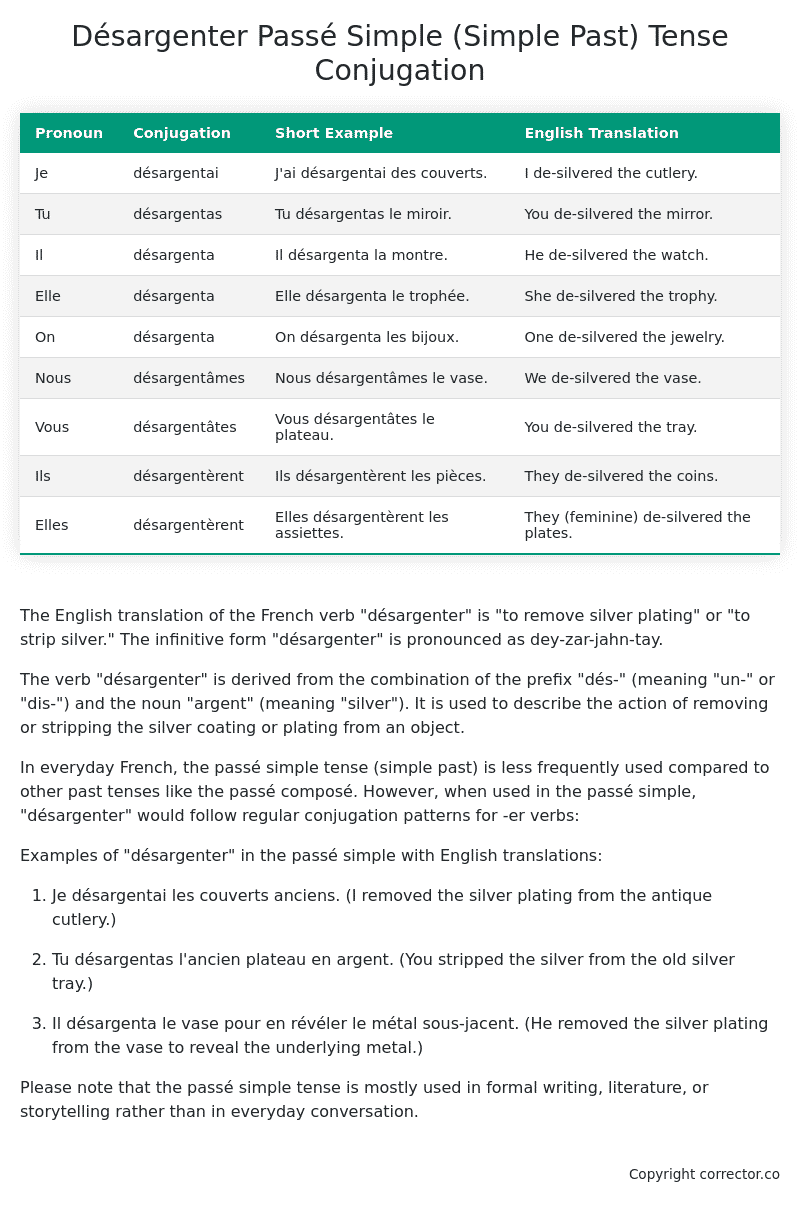Passé Simple (Simple Past) Tense Conjugation of the French Verb désargenter
Introduction to the verb désargenter
The English translation of the French verb “désargenter” is “to remove silver plating” or “to strip silver.” The infinitive form “désargenter” is pronounced as dey-zar-jahn-tay.
The verb “désargenter” is derived from the combination of the prefix “dés-” (meaning “un-” or “dis-“) and the noun “argent” (meaning “silver”). It is used to describe the action of removing or stripping the silver coating or plating from an object.
In everyday French, the passé simple tense (simple past) is less frequently used compared to other past tenses like the passé composé. However, when used in the passé simple, “désargenter” would follow regular conjugation patterns for -er verbs:
Examples of “désargenter” in the passé simple with English translations:
-
Je désargentai les couverts anciens.
(I removed the silver plating from the antique cutlery.) -
Tu désargentas l’ancien plateau en argent.
(You stripped the silver from the old silver tray.) -
Il désargenta le vase pour en révéler le métal sous-jacent.
(He removed the silver plating from the vase to reveal the underlying metal.)
Please note that the passé simple tense is mostly used in formal writing, literature, or storytelling rather than in everyday conversation.
Table of the Passé Simple (Simple Past) Tense Conjugation of désargenter
| Pronoun | Conjugation | Short Example | English Translation |
|---|---|---|---|
| Je | désargentai | J’ai désargentai des couverts. | I de-silvered the cutlery. |
| Tu | désargentas | Tu désargentas le miroir. | You de-silvered the mirror. |
| Il | désargenta | Il désargenta la montre. | He de-silvered the watch. |
| Elle | désargenta | Elle désargenta le trophée. | She de-silvered the trophy. |
| On | désargenta | On désargenta les bijoux. | One de-silvered the jewelry. |
| Nous | désargentâmes | Nous désargentâmes le vase. | We de-silvered the vase. |
| Vous | désargentâtes | Vous désargentâtes le plateau. | You de-silvered the tray. |
| Ils | désargentèrent | Ils désargentèrent les pièces. | They de-silvered the coins. |
| Elles | désargentèrent | Elles désargentèrent les assiettes. | They (feminine) de-silvered the plates. |
Other Conjugations for Désargenter.
Le Present (Present Tense) Conjugation of the French Verb désargenter
Imparfait (Imperfect) Tense Conjugation of the French Verb désargenter
Passé Simple (Simple Past) Tense Conjugation of the French Verb désargenter (You’re reading it right now!)
Passé Composé (Present Perfect) Tense Conjugation of the French Verb désargenter
Futur Simple (Simple Future) Tense Conjugation of the French Verb désargenter
Futur Proche (Near Future) Tense Conjugation of the French Verb désargenter
Plus-que-parfait (Pluperfect) Tense Conjugation of the French Verb désargenter
Passé Antérieur (Past Anterior) Tense Conjugation of the French Verb désargenter
Futur Antérieur (Future Anterior) Tense Conjugation of the French Verb désargenter
Subjonctif Présent (Subjunctive Present) Tense Conjugation of the French Verb désargenter
Subjonctif Passé (Subjunctive Past) Tense Conjugation of the French Verb désargenter
Subjonctif Imparfait (Subjunctive Imperfect) Tense Conjugation of the French Verb désargenter
Conditionnel Présent (Conditional Present) Tense Conjugation of the French Verb désargenter
Conditionnel Passé (Conditional Past) Tense Conjugation of the French Verb désargenter
Conditionnel Passé II (Conditional Past II) Tense Conjugation of the French Verb désargenter
L’impératif Présent (Imperative Present) Tense Conjugation of the French Verb désargenter
L’impératif Passé (Imperative Past) Tense Conjugation of the French Verb désargenter
L’infinitif Présent (Infinitive Present) Tense Conjugation of the French Verb désargenter
L’infinitif Passé (Infinitive Past) Tense Conjugation of the French Verb désargenter
Le Participe Présent (Present Participle) Tense Conjugation of the French Verb désargenter
Le Participe Passé (Past Participle) Tense Conjugation of the French Verb désargenter
Struggling with French verbs or the language in general? Why not use our free French Grammar Checker – no registration required!
Get a FREE Download Study Sheet of this Conjugation 🔥
Simply right click the image below, click “save image” and get your free reference for the désargenter Passé Simple tense conjugation!

Désargenter – About the French Passé Simple (Simple Past) Tense
Formation
Usage
Narration
Historical Context
Interactions with other tenses
Passé Composé
Imparfait
Conditional and Subjunctive
Summary
I hope you enjoyed this article on the verb désargenter. Still in a learning mood? Check out another TOTALLY random French verb conjugation!


